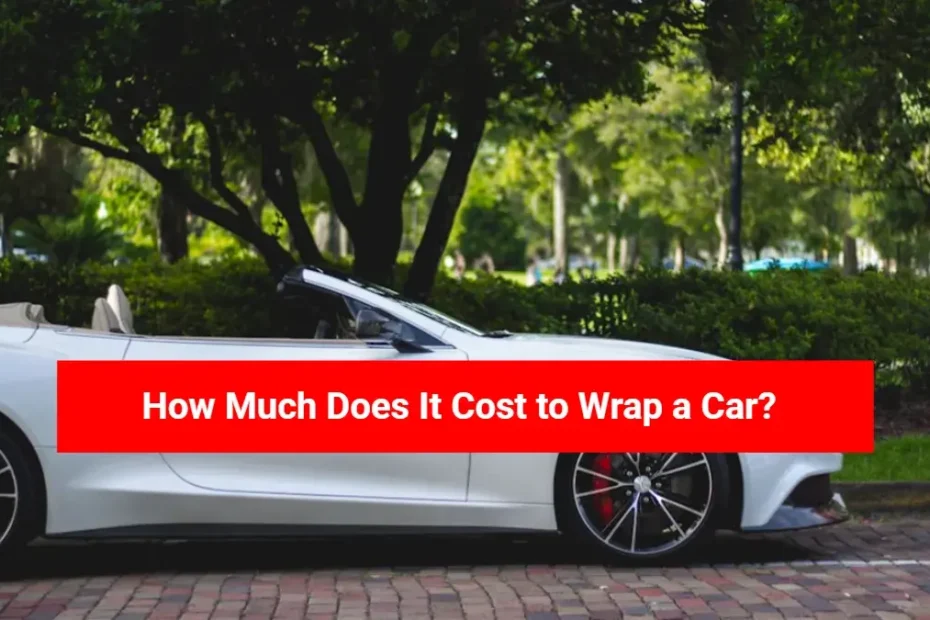Wrapping a car has become an increasingly popular way to customize and protect your vehicle. Whether you’re looking to change the look of your car for aesthetic reasons, promote a business, or preserve the original paintwork, a car wrap offers a unique and versatile solution. But how much does it cost to wrap a car? The cost can vary based on several factors, including the size of the vehicle, the type of wrap, and the location of the service provider. Let’s take a closer look at these variables to help you understand what goes into the cost of a car wrap.
Table of Contents
What is a Car Wrap?
A car wrap is a large vinyl graphic that is applied to the exterior of a vehicle. The wrap can cover the entire vehicle or just certain parts, depending on the style and preferences of the owner. Car wraps are often used for advertising purposes, but they can also be a great way to personalize your vehicle with custom colors, designs, or patterns.
The wrap itself is made from high-quality vinyl, which can be printed with custom graphics or designs. There are two main types of car wraps: full wraps and partial wraps. A full wrap covers the entire vehicle, while a partial wrap only covers specific parts such as the hood, roof, or doors.
How Much Does It Cost to Wrap a Car?
The cost of wrapping a car can vary significantly depending on several factors. On average, the cost of a full car wrap ranges from $2,000 to $5,000. Partial wraps can cost anywhere from $500 to $2,000. Here are the main factors that influence the cost of a car wrap:
1. Vehicle Size
One of the biggest factors in determining the cost of wrapping a car is the size of the vehicle. Larger vehicles, such as SUVs, trucks, and vans, will generally cost more to wrap than smaller vehicles, such as sedans or hatchbacks. This is because larger vehicles require more vinyl material, more labor, and longer installation times.
2. Type of Wrap Material
There are different types of vinyl materials available for car wraps, and the quality of the material will impact the price. The two most common types are:
- Cast Vinyl: This is the highest-quality vinyl and is known for its durability and ability to conform to the vehicle’s surface without wrinkles. Cast vinyl is typically used for full car wraps, and it can last anywhere from 5 to 7 years.
- Calendared Vinyl: This material is less expensive and less durable than cast vinyl. It is best suited for temporary wraps or partial wraps. Calendared vinyl typically lasts 3 to 5 years.
Higher-quality materials will cost more, but they also offer better durability and longevity. If you’re looking for a wrap that will last for several years, it’s worth investing in higher-quality materials, even though it will raise the price.
3. Design Complexity
The complexity of the design also plays a significant role in the cost of a car wrap. A simple, solid color wrap will generally cost less than a custom wrap that includes intricate graphics, logos, or patterns. If you’re adding custom designs or artwork, you may need to pay extra for the design work and printing. The more complicated the design, the more time it will take to install the wrap, and the more expensive it will be.
4. Labor and Installation
The skill and experience of the installer can also affect the overall cost of a car wrap. A high-quality installation job will ensure that the wrap is applied smoothly, without bubbles, wrinkles, or seams. This requires skilled labor, and experienced installers may charge more for their services.
The installation process typically takes several days, depending on the size of the vehicle and the complexity of the wrap. Keep in mind that if you’re choosing a reputable company with experienced installers, you may be paying a premium for their expertise.
5. Location and Service Provider
The cost of wrapping a car can vary by location. Prices may be higher in larger cities or areas with a higher cost of living. Additionally, the pricing structure of different service providers can vary. Some companies may offer discounts or promotions, while others may charge a premium for their services. It’s important to get quotes from multiple providers to compare prices and services before making a decision.
6. Type of Wrap
As mentioned earlier, you can choose between a full car wrap and a partial car wrap. A full wrap, which covers the entire vehicle, is typically the more expensive option. If you’re only interested in wrapping certain parts of your car, such as the hood or the roof, a partial wrap may be a more affordable choice. The cost of a partial wrap can also vary depending on how much of the vehicle you want to cover.
7. Vehicle Condition
The condition of your car’s paintwork can also impact the cost of a car wrap. If your car has significant damage to its paint, such as scratches, dents, or rust, the wrap may not adhere properly, and additional preparation work may be required. This could include sanding, filling, or painting the surface to ensure a smooth and clean base for the vinyl wrap. This extra work will add to the overall cost.
Additional Costs to Consider
In addition to the base cost of the car wrap, there may be additional costs involved. For example:
Removal of Old Wrap: If you’re replacing an old car wrap, you may need to factor in the cost of removal. This can cost anywhere from $500 to $1,500, depending on the size of the vehicle and how long the wrap has been on the car.
Wrap Maintenance: While car wraps are designed to be durable, they do require maintenance to keep them looking their best. This includes regular washing and cleaning to avoid fading and peeling. You may also need to apply protective coatings to the wrap to extend its lifespan.
Wrap Customization: If you want to add custom designs, logos, or graphics to your wrap, this could increase the cost. Some companies may charge a separate fee for graphic design services.
Pros and Cons of Car Wrapping
Pros:
- Customization: Car wraps offer endless possibilities for customization, allowing you to create a unique look for your vehicle.
- Protection: A car wrap can protect the original paint from scratches, chips, and UV damage.
- Advertising: If you own a business, a car wrap can be an effective and eye-catching form of advertising.
- Reversible: Unlike paint, car wraps can be removed without damaging the underlying paint, making it a great option for those who want to change their car’s appearance periodically.
Cons:
- Initial Cost: Wrapping a car can be expensive, especially for high-quality materials and custom designs.
- Durability: While car wraps are designed to last several years, they may not last as long as the original paint, especially if the vehicle is exposed to harsh weather conditions.
- Maintenance: Car wraps require regular care to keep them looking good, including washing and occasional touch-ups.

